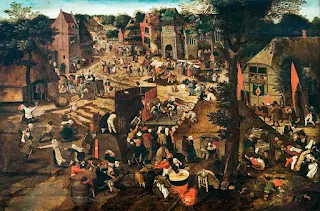There’s more to say about our little adventure from the
Marxist point of view. In the eighteenth
century, the physiocrats and economists, as they were newly named, campaigned
against the older form of market society centered on the fair – against which
they proposed the market. In the fair, the exchanges were defined not simply by
barter or the exchange of money for products, but by other social forces as
well – tests of masculinity, alliance makinng, sexual adventure, and various non-economic
pleasures. A simple way of speaking about this is to say that the products in
the fair weren’t fully commoditized. In the ideal market, the products were.
Transactions came down to the calculus between the utility of the consumer and
the utility of the seller. In a sense, the objects were stripped of everything
alien to their exchange nature.
Marx, of course, saw this logic as a social force that would eventually sweep away all remnants
of the older market society – the pre-capitalist society. As it happens, the
pre-capitalist world is still all around us, even in the most capitalist of
countries. Commodification meets its limits in the very nature of the nexus upon
which it depends – that is, in the irresistable sociability that attends all human
encouters.
Car sales in the US are strongly fair-like. Updike was
shrewd, in his four Rabbit novels, to move his protagonist from a factory
figure to a car salesman. Rabbit’s idea of the car lot as a place of seduction
and masculine competition plugs into every car lot I’ve ever gone to. A. finds
it almost unbearable, the simultaneous brazen pressure to buy and the pressure
to prove one’s manhood – as she said about one of the guys we dealt with, he
practically pulled down his pants and showed us his big balls. In this forum,
the customer who is best adapted to haggle, to negotiate, must know about cars
and must exhibit that knowledge in its ideolect. The car lot is a place for
victory and defeat, not a market for economically rational transactions.
This is where Carmax is so brilliant and, from a certain
perspective, so oppressive. Here, the whole culture of sociability and
masculinity assembled around automobiles is calmly tossed into the garbage.
There are no negotiations here, there’s no haggling, there are no victories.
Just as when I buy an aspirin at the grocery store, a transaction that requires
minimum knowledge of chemistry on my part and on the part of the clerk who
checks me out, at CarMax, the fair like aspects of the transaction have been
minimized. Interestingly, the decorations, size and layout of the place denies
this simple, inhuman fact – the car lot looks much more utilitarian, with its
assembled jam of cars. As the fair is condemned to death, its emblems are
stolen and employed to disguise the death.




